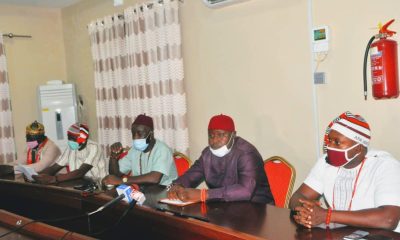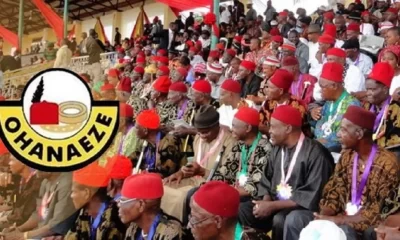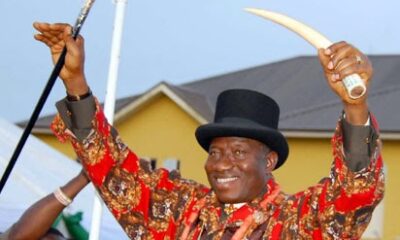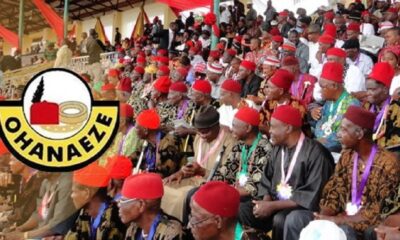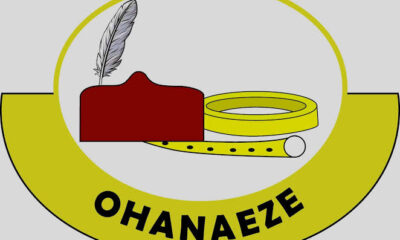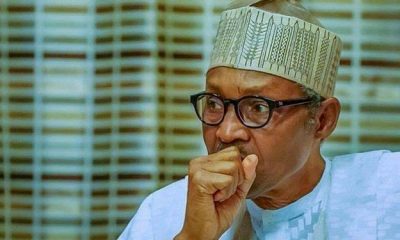NEWS
Presidency slams ACF, Nwodo, Adebanjo over restructuring
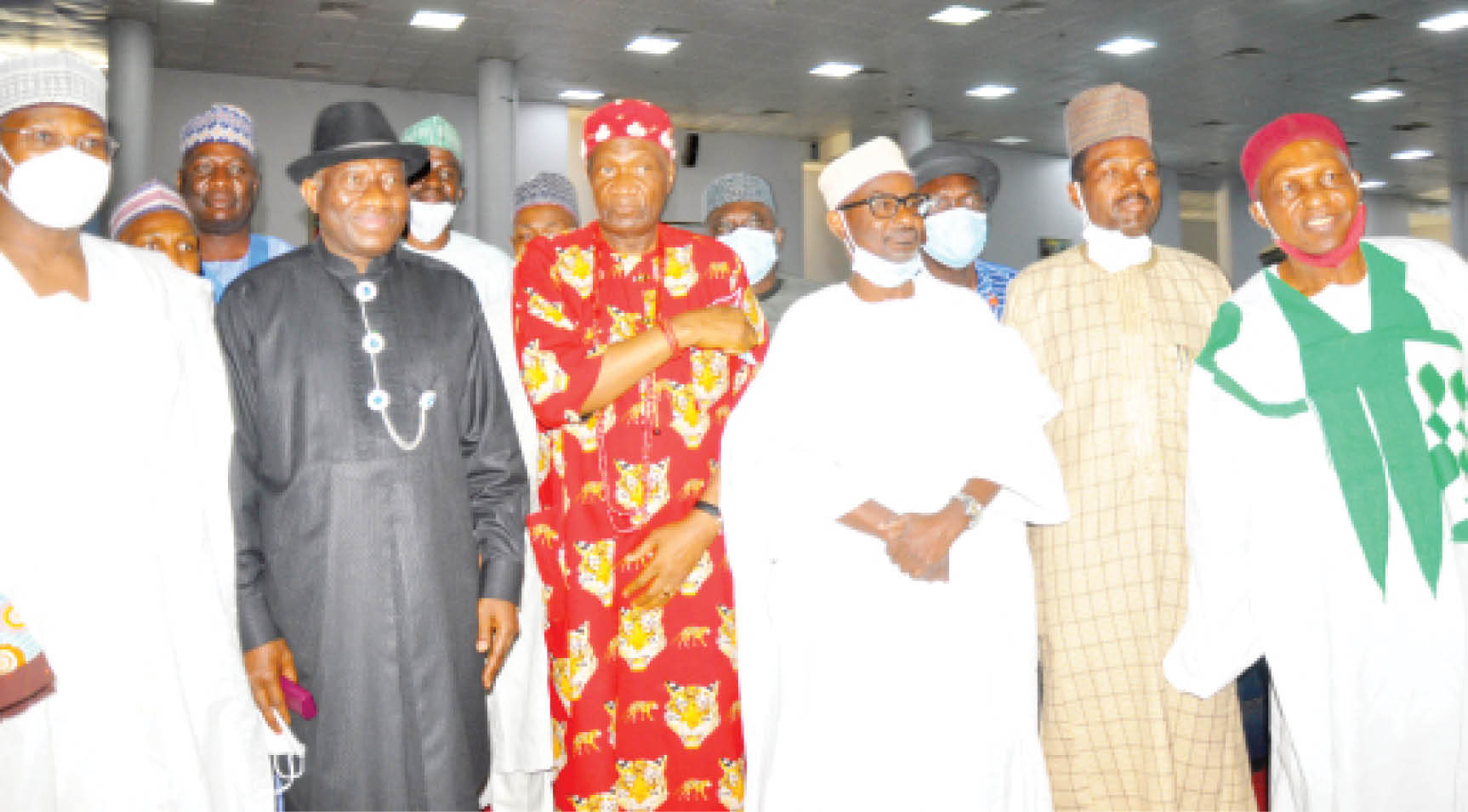
Top Nigerian leaders, including the immediate past President-General of Ohanaeze Ndigbo, Chief John Nwodo; a chieftain of Afenifere, Chief Ayo Adebanjo and the Chairman of the Arewa Consultative Forum, Chief Audu Ogbeh, on Thursday said there was an urgent need to restructure Nigeria for it to attain its full potential.
They made the call at the 18th Daily Trust Dialogue with the theme: ‘Restructuring in Nigeria: Why? How? When?’
The prominent Nigerians suggested that the country should be restructured to make Nigeria work for all citizens.
The President’s Special Assistant on Media and Publicity, Garba Shehu, said it was only the National Assembly that was empowered to restructure the country.
He, therefore, advised proponents of restructuring to approach the legislature. On his part, the Spokesman for the Senate, Ajibola Basiru, described restructuring as a slogan.
He called on advocates of restructuring, who had submitted memoranda to the Senate Committee on Constitution Review to meet their senators with a view to educating them better on the type of restructuring they were advocating.
In his remarks at the summit, Nwodo said, “We must restructure to revamp our agriculture. When I speak of restructuring, some of my northern Nigerian friends have suggested to me that I do not want the North to partake in the oil revenue of Nigeria.
“Well, I have just outlined the indisputable fact that oil is a fast-drying resource for earning foreign exchange. The truth is that the reliable source of revenue now is agriculture
“The Netherlands is today the largest exporter of food in the world. Its cross-sectional area is about half the size of Niger State. It is the world’s largest exporter of potatoes. Its revenue from vegetables and dairy contributes more than $100bn annually to its economy. The secret is education, better mechanised farming, growth of green farm technology, drone monitoring systems and land reclamation by building of dams.
“Northern Nigeria is Nigeria’s greatest treasure in agriculture. Northern Nigeria is blessed with diverse livestock production with its capacity for dairy production. It has various tubers of potatoes, yam, cassava and cocoyam.
“Under a restructured Nigeria, Northern Nigeria will earn more from food production than the Netherlands. We must restructure because our current electoral system is dysfunctional and does not elicit confidence.”
Nwodo also said restructuring would address insecurity in the country.
He stated, “We must restructure to reduce insecurity in our country. While I was working on this speech on Monday, 18 January 2021, I paused to read the news for the day. I saw the following headlines: Bandits kill octogenarian, 14 others in Zamfara, Kaduna attacks
“Cops arrest Police Sergeant for robbery in Port Harcourt; Robbers kill 22-year-old IT prodigy in Lagos; Gunmen hack Catholic priest to death, kidnap brother in Niger State, Bandits abduct 17 persons in Niger State. All these in one day.”
While making a case for state police, the elder statesman said modern philosophy for security is local policing.
On when Nigeria should be restructured, Nwodo said, “We must do all we can to restructure before the next election in 2023 because the level of dissatisfaction in the country as evidenced by the last #EndSARS protest gives one the impression that any delay may lead to a mass boycott or disruption of the next elections to the point that we may have a more serious constitutional crisis of a nation without a government.
“To restructure, Nigeria we need a constitutional conference of the ethnic groups in Nigeria. To use the current National Assembly as the forum for constitutional amendments grants a recognition of the overthrow of our democratic norms by the enthronement of a military constitution by which they are composed.”
Adebanjo, in his contribution, noted that the 1999 Constitution, which was bequeathed to the nation by the General Abdulsalami Abubakar-led military regime, was fraudulent.
He argued that for any meaningful discussion to hold on a better structure for the country, the document should be discarded and in its place a people generated constitution in the mould of the 1960 and 1963 constitutions should be revisited.
Adebanjo said, “This is not the constitution that Nnamdi Azikiwe, the Sardauna of Sokoto and Chief Obafemi Awolowo agreed to. All the problems we are having today is because of the fraudulent constitution that we are operating today.”
A former National Chairman of the Independent National Electoral Commission, Prof. Attahiru Jega, after explaining factors responsible for the growing agitation for restructuring, identified bad governance and the failure of the current system to address the myriad of socio-political economic problems facing the country as largely responsible.
Jega said, “After a critical evaluation of the benefits versus the costs of each of these notions of restructuring, I believe that the starting point of desirable and serious, even realistic, restructuring is equitable redistribution of power and resources from the Federal Government to the sub-national governments.
According to him, dismantling the current states’ structure and reconfiguring the states into pre-1966 regions, or into six geo-political regions or even into 12 states of 1976/7 are unrealistic.
He stated, “The social and political costs of such an undertaking would by far outweigh the benefits. In many fundamental respects, creation of states has gone a long way to mitigate real and imagined/perceived marginalisation of minorities.”
In his remarks, former President Goodluck Jonathan explained that Nigerians should exploit every opportunity on dialogue in order to make the nation better.
He said, “My conviction is that discussion on restructuring will not help except we restructure our minds because some of the challenging issues at the national level still exist at the state and local levels
“For instance, in some states, it is not easy for some persons to win an election because of the area they come from. The language they speak or their religious belief.
“Take a look at how local government elections are conducted at the state level. Why is it very difficult for an opposition party to win a chairmanship or councillorship seat in a state, despite the fact that the same party probably secured seats in the state Assembly and National Assembly elections, organised by a federal election management body?
“This shows that restructuring alone may not solve all the anomalies in the system.”
In their separate remarks, Ogbeh and the Secretary General of the Northern Elders Forum, Dr Hakeem Baba Ahmed noted that the North believed in Nigeria.
Ogbeh said, “We are in a country where the only big business is the government. Nwodo made a very important point. The economy of this country is dying so fast. We say the 1960 constitution was very good. If it was so good, why was there a coup on January 15, 1966 with that bloody massacre of leaders both military and civilian and six months later there was a counter-coup and the civil war where two million people, mostly in the South-East, died. What was the cause if the constitution was perfect? The big issue is the economy. In dealing with the problems confronting us, restructuring is absolutely necessary.
“In what shape is the question. Will states surrender their autonomy, like Jega said, very unlikely. Are we returning to the regions of 1960? Very unlikely, that is where the problem lies. Baba-Ahmed said it was not true that the North was opposed to restructuring.
Meanwhile, former President Goodluck Jonathan has said the quest for restructuring may not work until issues that divide Nigerians are resolved. Mr. Jonathan stated this on Thursday at the 18th Daily Trust Dialogue.
He lamented how divisive politics and mistrust have retarded the progress of the country.
The former president,whose administration convened the 2014 National Conference, prioritised restructuring as a way forward for the country but not without love and unifying leaders.
Against the country’s prevailing ethnic and religious borderlines, he urged Nigerian leaders to encourage a “healthy conversation on restructuring and reforms that stir national pride and love and faith of our citizens in our beloved country.”



